SRI LANKA SERENDIPITY (2014-2015)
Serendipity is the phenomenon of finding valuable things not sought for.
I chose this word to entitle my project in Sri Lanka during the 10 days before one of the major events of the recent history of the country: the presidential election held on 8 January 2015 - two years ahead of schedule - that ended with the presidency of Mahinda Rajapaksa.
I traveled into the soul of the country in a crucial moment for its future. During my time there, I met a population that went through major difficulties in the last 30 years (25 years of cruel war and the tsunami in 2004) but that did not lose his positive attitude.
Serendipity is all about that. It is about the warm smile of Sri Lankan people that welcome you and their pride and hope for tomorrow. It is an emotional deep dive into the normality of daily life during decisive hours for the future.
The presidential election held in January 2015 was so important because the president, Mahinda Rajapaksa, is a very controversial politician. During his government, he managed to end the 25-year internal conflict that left on the ground more than 70.000 people, damaged the economy for almost three decades and harmed tourism in one of South Asia's potentially most prosperous societies. He also had to deal with the reconstruction of the country after the tsunami that hit the coasts of Sri Lanka in 2004 and caused 38.000 deaths.
Mr. Rajapaksa was repeatedly accused of war crimes and corruption. A UN report published in 2011 said both sides in the conflict committed war crimes against civilians. The Sri Lankan government rejected this and later reports as biased.
The new president and former member of the government - Mr. Sirisena - was declared the winner after receiving 51% of all votes driven by ethnic minorities and the result was generally seen as a shock. On 11 January 2015 the new government announced a special investigation into allegations of an attempted coup by Rajapaksa during the final moment before announcing the Presidential election results. The government argued that Rajapaksa attempted to seize the poll counting centers when Rajapaksa realized that he is losing the election.















